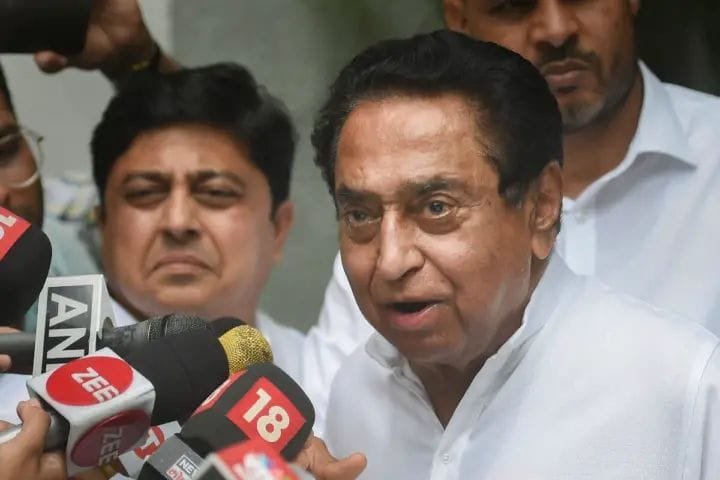In the binary politics of Madhya Pradesh dominated by the BJP and Congress, the ‘Muslim vote factor’ may be insignificant unlike Uttar Pradesh and Bihar, but the minority vote may prove crucial in at least 22 seats in the event of a neck-and-neck contest in the next month’s assembly polls.
According to Mohammed Mahir, convenor of Madhya Pradesh Muslim Vikas Parishad who belongs to Congress, the Grand Old Party’s vote share in the 2018 assembly polls went up by least 3-4 per cent enabling it to narrowly surge ahead of the BJP.
He said MP Congress chief Kamal Nath had said in 2018 that the party could form a government if 90 per cent of minority votes are polled in the party’s favour.
“On Nath’s appeal, minority votes were polled for Congress and the result was 10-12 more seats being added to the party’ kitty which the party had failed to win in 2008 and 2013,” Mahir claimed.
Notably, the vote share of the BJP (41.02 per cent) was slightly higher than the Congress (40.89 per cent) in the previous polls even though Congress had emerged as the single largest party winning 114 out of 230 seats, restricting the BJP to 109.
The Congress subsequently formed a coalition government with the support of MLAs from the SP and BSP and Independents. The government, however, collapsed after 15 months due to defection by Congress MLAs.
A two-party system prevails in Madhya Pradesh with the balance tilted in favour of majoritarian, Mahir told PTI.
Whenever voters get angry with the BJP, they elect a Congress government and vice-versa. Muslim population in Madhya Pradesh is 7 per cent according to the 2011 Census which might be 9-10 per cent now.
The Muslim vote is effective in 47 assembly seats while they are a deciding factor in 22 segments, he claimed. According to Mahir, these 47 seats have Muslim voters between 5,000 to 15,000, while their number ranges from 15,000 to 35,000 in 22 assembly segments.
“This means Muslim voters are a deciding factor in 22 seats in case of a neck-and-neck contest. These seats include three segments from Bhopal, two in Indore, Burhanpur, Jaora and Jabalpur among others,” he added.
Mahir claimed the traditional Congress vote (which also includes non-Muslims) is not getting transferred to their candidates and it is the party’s responsibility to take such electors to the booths to ensure the victory of candidates from the minority community.
According to Mahir, the Muslim representation in the Madhya Pradesh assembly has remained restricted to Bhopal North and Bhopal Central seats over the years.
Notably, after a gap of almost two decades, the MP assembly saw two MLAs from the Muslim community- Arif Aqueel and Arif Masood of Congress- getting elected in the 2018 elections from Bhopal North and Bhopal Central constituencies, respectively. In the 1998 assembly polls, Arif Aqueel and Sayeed Ahmed won from the Bhopal North and Satna constituencies, respectively. In 2003, Hameed Qazi was elected from Burhanpur.
The Bhopal North seat, currently represented by Arif Aqueel, stands out for electing Muslim MLAs in the last four decades, barring 1993, in favour of Congress. After winning the Bhopal Central segment post delimitation in 2008 and 2013, the BJP lost to Arif Masood of Congress who defeated sitting MLA Surendra Nath Singh in 2018.
Congress veteran Arif Aqueel, 71, has been representing the Bhopal North seat since 1990, except in 1993. Mahir said BJP’s experiment to field leaders from the Muslim community in 2013 and 2018 from the Bhopal North constituency failed to click.
In the forthcoming assembly elections, Congress has given a ticket to Arif Aqueel’s son, Atif Aqueel, in view of his father’s health condition. Atif will challenge former city mayor and BJP nominee Alok Sharma. Arif Masood is again in the fray from Bhopal Central on a Congress ticket against Dhruv Narayan Singh, who had first won the constituency for the saffron party in 2008.
Mahir claims Bhopal North is not a Muslim-dominated seat and Arif Aqueel could emerge victorious only due to the support from non-Muslim voters, who are traditionally loyal to the Grand Old Party.
It is the party’s responsibility to take such electors to the booth to ensure minority candidates’ victory, he said. All these factors are reducing the Muslim representation in Madhya Pradesh, he said and listed names of several Muslim leaders who had won polls from Ujjain, Jabalpur central, Satna, and Burhanpur among others in the past.
Speaking on Muslim participation in electoral politics, Madhya Pradesh Wakf Board chairman and BJP spokesman Sanwar Patel alleged the Congress had cheated minorities.
“The Congress wants 90-100 per cent vote share by fielding two candidates in the state even though it has done nothing for the Muslim community in 53 years of its rule in the state (until 2003),” he told PTI.
Patel said the BJP had not only given tickets to candidates from the minority community but also ensured the socio-economic growth of Muslims, who he said remained backwards when Congress was in power.
“The BJP believes in inclusiveness and ensures participation of Muslims, their healthcare and overall development,” he added.
Senior journalist Girja Shankar said minorities cannot impact Madhya Pradesh politics much.
“Though minority voters are influential in Burhanpur, Ashta, Ratlam, and Indore, Bhopal is an exception as far as the concentration of their votes is concerned,” he said, adding that unlike UP and Bihar, the Muslim factor has no impact on Madhya Pradesh electoral politics.
He said the BJP had failed to draw Muslim votes due to a strong divide in Bhopal North in past elections. Polling in Madhya Pradesh will be held on November 17 and votes will be counted on December 3.







